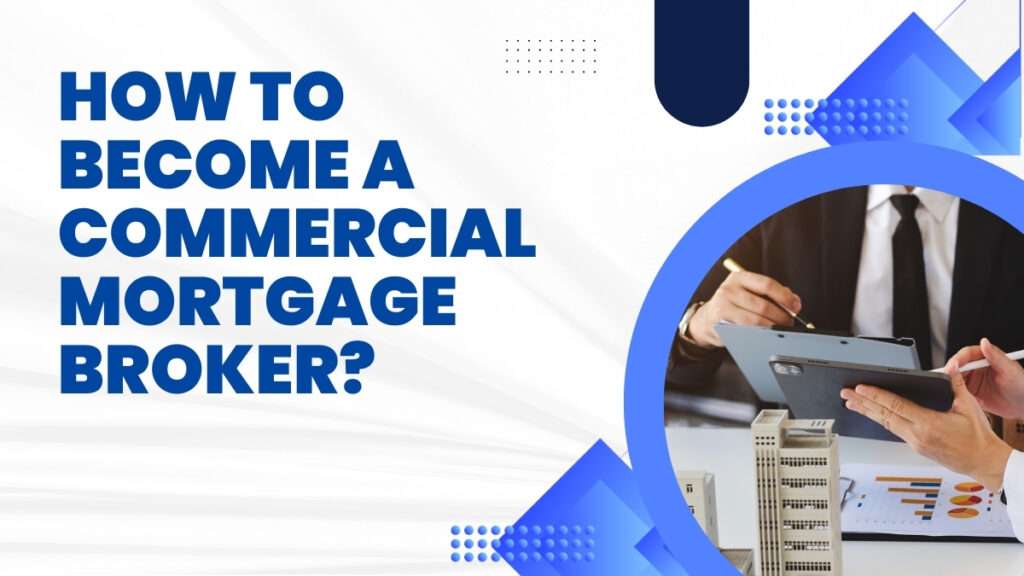Are you looking for a career that combines business savvy with real estate? Becoming a commercial mortgage broker could be the perfect fit! Imagine helping businesses secure financing for their properties while earning a commission.
Whether you’re interested in working for yourself or joining a firm, the path to success is within reach. But how do you get started? What are the essential steps you need to take?
In this guide, we’ll walk you through everything—from education and licensing to building valuable relationships and mastering the market. Ready to dive in? Let’s get started!
What Is a Commercial Mortgage Broker?
A commercial mortgage broker is a professional who helps businesses and investors secure financing for commercial real estate properties. They act as intermediaries between borrowers and lenders, guiding clients through the process of obtaining loans to buy, refinance, or improve commercial properties.
Unlike residential mortgage brokers, who deal with homebuyers, commercial brokers focus on larger properties, such as office buildings, shopping malls, industrial spaces, and multi-family units.
Importance of Commercial Mortgage Brokers
Commercial mortgage brokers are important in real estate deals because they help clients secure the right financing and navigate the process. Here’s how they assist:
Finding the Right Loan Products
Brokers have access to many lenders and loan options, making it easier to find the best loan for the client’s needs.
For example, a broker could help a small business get an SBA loan, which offers lower down payments compared to regular loans.
Explaining Complex Financial Terms
Commercial loans often have confusing terms. Brokers break down details like interest rates and repayment plans to help clients understand them.
A broker might explain the difference between a fixed-rate loan and a variable-rate loan, so the client can choose the best option for their budget.
Negotiating Better Deals
Brokers use their experience to negotiate better terms, such as lower interest rates and more flexible repayment schedules.
For example, a broker could help a business owner secure a lower interest rate, saving them money over time.
Connecting Clients with Specialized Lenders
Brokers know which lenders specialize in different types of loans, helping clients find the right lender for their needs.
For instance, a broker might connect a real estate investor with a lender that specializes in loans for apartment buildings.
Saving Time and Effort
Brokers handle much of the paperwork and the loan process, saving clients time and effort.
For example, A broker could take care of submitting all the documents for a construction loan, making the process smoother for the client.
Offering Expert Advice
Brokers provide helpful advice to guide clients through the loan process and help them make the best financial choices.
For example, a broker might suggest refinancing a loan to take advantage of lower interest rates, helping a business save money.
Commercial mortgage brokers are valuable in real estate transactions because they simplify the process, find the best loan options, and provide expert advice to help clients make smart financial decisions.
What Does Commercial Mortgage Broker Do?
A commercial mortgage broker helps clients through the loan process. Here’s what they do:
Consulting with Clients
They assess the client’s financial situation and help them pick the right loan for their needs.
For example, a broker might help a business owner decide between an SBA loan or a traditional loan based on their finances.
Gathering Financial Information
Brokers collect necessary documents like business financials, credit reports, and property appraisals.
For instance, a broker might ask for the client’s tax returns and financial statements to give to the lender.
Matching Clients with Lenders
Brokers use their network to connect clients with lenders offering the best rates and terms for their situation.
A broker might find a lender who specializes in real estate loans for a property investor to get the best deal.
Facilitating the Loan Process
Brokers guide clients through the loan approval, underwriting, and closing steps to make sure everything runs smoothly.
For example, a broker helps the client prepare for an appraisal and works with the lender to avoid any delays.
Ensuring Legal and Ethical Compliance
Brokers make sure all transactions follow the law and that clients understand the loan terms.
A broker might explain the loan agreement, so the client understands the interest rates, fees, and repayment schedule.
Commercial mortgage brokers help clients choose the right loan, gather paperwork, find the best lenders, and guide them through the process.
Skills Required
To be a good commercial mortgage broker, you need a mix of technical and people skills. Here are the key skills:
Financial Knowledge
You should understand financial reports, cash flow, and how loans work.
For example, a broker needs to understand if a business can afford a loan by looking at their financial statements.
Attention to Detail
You must carefully check loan applications, contracts, and financial data to avoid mistakes.
A broker needs to make sure all documents are correct before sending them to a lender.
Negotiation Skills
You should be able to negotiate better loan terms and interest rates for clients.
For example, a broker can negotiate a lower interest rate for a business to save them money.
Communication Skills
You need to communicate clearly with clients, lenders, and others.
A broker must explain loan options in simple terms to clients so they understand what’s best for them.
Problem-Solving
You should be able to help clients find solutions when they face challenges, like getting a loan for a tricky property.
If a client is having trouble getting a loan for a high-risk property, the broker may find a lender who can help.
Commercial mortgage brokers need to know finance, pay attention to details, negotiate well, communicate clearly, and help clients solve problems to get the right loans.
How to Become A Commercial Mortgage Broker?
Dreaming of a career as a commercial mortgage broker? Learn the steps to get licensed, build your skills, and start helping businesses secure the funding they need!
Education and Licensing
To get started, you’ll need a high school diploma or equivalent, but a degree in finance or real estate can help.
Steps to Get Licensed
Pre-Licensing Education: Take courses on mortgage laws, ethics, and finance.
Pass the Licensing Exam: After your courses, you’ll need to pass an exam about mortgage laws and financial principles.
Register with Authorities: You must register with a state or provincial body and pay fees.
Pro Tip: Many brokers start by getting certified in real estate or finance to increase their credibility and knowledge.
Experience
Practical experience is essential to understand the market and loan processes. Starting with internships or entry-level positions is a great way to build skills.
Why Experience Matters?
Learn how to assess different property types and evaluate financial statements.
Build a network of clients and industry professionals.
Understand the real estate market and loan processes firsthand.
How to Gain Experience?
Internships: Start with internships at mortgage brokerages or real estate firms.
Work Under a Licensed Broker: Partner with experienced brokers to learn the ropes.
Certifications: Consider earning certifications in commercial mortgage brokering for credibility.
Pro Tip: Even while you’re starting, focus on building a strong network. The connections you make now can be your future clients.
Networking
Building a strong network is key for success. Relationships with lenders, real estate agents, and professionals can help you find clients and opportunities.
How to Network
Attend Events: Go to industry conferences or networking events.
Join Professional Groups: Be part of organizations like the Mortgage Professionals Canada (MPC).
Use Social Media: Connect with professionals on LinkedIn or industry-specific forums.
Pro Tip: Consistency is key. Regularly follow up with people you meet, even if you don’t need anything from them at the moment.
Understanding Commercial Real Estate
It’s important to understand the various commercial properties and how they’re financed.
Key Areas to Learn
Types of Properties: Know the difference between office buildings, retail spaces, and industrial properties.
Financing: Commercial loans have different terms than residential ones, like interest rates and down payments.
Market Trends: Stay updated on factors like interest rates, local zoning laws, and property demand.
How to Stay Informed?
Follow industry news, and subscribe to real estate and mortgage publications.
Pro Tip: Keep an eye on interest rates and local market changes—they can directly affect your clients’ financing options.
Financial Analysis
You must assess the financial health of your clients to ensure they can repay loans.
Key Concepts
Financial Statements: Learn to read balance sheets and income statements.
Cash Flow Analysis: Determine if the property will generate enough income to cover expenses and loan payments.
Debt Service Coverage Ratio (DSCR): This shows whether the borrower can repay based on the property’s income.
Pro Tip: Use financial analysis tools like Excel to simplify your calculations and analysis.
Marketing and Sales
To grow your business, marketing and sales strategies are important.
How to Market Your Services?
Create an Online Presence: Build a professional website and showcase client testimonials.
Content Marketing: Share useful tips or write blogs to attract clients.
Referral Programs: Offer incentives for clients who refer others.
Sales Tips
Build Trust: Focus on building long-term relationships, not just one-off deals.
Tailored Financing: Offer financing solutions that suit each client’s needs.
Pro Tip: Personalize your marketing efforts by focusing on the specific needs of different clients—every business has unique challenges.
Ethical Considerations
Being ethical is crucial in this industry. Stick to the rules to maintain a good reputation.
Ethical Guidelines
Honesty and Transparency: Be clear about fees and risks.
Follow the Law: Adhere to all commercial lending laws.
Confidentiality: Always protect your clients’ private information.
Challenges to Consider
Competition: It can be tough to stand out in a crowded market.
Economic Risks: Changes in the economy, like rising interest rates, may affect your business.
Long Sales Cycle: Commercial deals take time, requiring patience and persistence.
Pro Tip: Being transparent and consistent in your dealings will help you build a reputation for trustworthiness in the market.
Statistics About Commercial Mortgage Broker
In Canada, commercial mortgage brokers are key in helping businesses and real estate investors get financing. Here are some key statistics:
Commercial Mortgage Volume: In Ontario, brokers arranged $32.2 billion in commercial mortgages in 2021, an 8.2% increase from the year before.
Overall Market Growth: The total value of all brokered mortgages (both residential and commercial) in Canada reached $193 billion in 2021, a 12.2% increase from 2020.
Commercial Real Estate Investment: The total investment in commercial real estate in Canada was $23.5 billion in 2021, up from $18.6 billion in 2020, showing strong demand.
Market Share: Mortgage brokers handle about 50% of all mortgage transactions in Canada, including commercial ones.
Loan-to-Value Ratios (LTV): For commercial mortgages, the typical Loan-to-Value ratio is between 65-75%, depending on the property and borrower.
These numbers show that the demand for commercial real estate financing is strong, and brokers continue to play an important role in the market.
Tools and Technologies to Enhance Your Practice
Several tools and technologies can help streamline the work of a commercial mortgage broker:
Loan Management Software: Tools like Ellie Mae or Mortgage Automator help you keep track of loans, client details, and documents.
Financial Analysis Tools: Programs like Microsoft Excel or FinanCierge help you understand financial data, like loan payments and income, to make smart decisions.
CRM Software: Tools like Salesforce help you organize client information, track follow-ups, and stay on top of communication.
Online Marketing Tools: Use platforms like Google Ads and LinkedIn to find new clients and grow your business online.
Tips for Success as a Commercial Mortgage Broker
Want to thrive as a commercial mortgage broker? Discover essential tips to build strong client relationships, close deals, and grow your business successfully!
Build a Strong Network
Make connections with real estate agents, lenders, attorneys, and investors.
This helps you find better options for clients and grow your business.
Stay Educated
Keep learning about industry changes, loan products, and regulations.
Staying updated keeps you competitive in the field.
Offer Personalized Service
Understand your clients’ needs and offer solutions that fit them best.
Personal service builds trust and helps you stand out.
Use Technology
Use digital tools to keep track of client info and financials.
Technology helps you stay organized and work more efficiently.
Be Patient and Persistent
Commercial deals take time to close, so don’t rush.
Keep following up with clients and lenders to move the process along.
Challenges and Rewards of Being a Commercial Mortgage Broker
Thinking of becoming a commercial mortgage broker? Discover the unique challenges and exciting rewards that come with helping businesses secure the funding they need!
Challenges
Highly Competitive: The commercial mortgage industry is competitive, requiring brokers to differentiate themselves by offering exceptional service or unique expertise.
Long Sales Cycle: Commercial real estate deals often take months to close, requiring brokers to be patient and persistent.
Economic Fluctuations: Market conditions, such as interest rate changes or economic downturns, can affect the demand for commercial loans.
Regulatory Compliance: Keeping up with changing laws and regulations can be difficult, but is necessary to remain compliant.
Rewards
High Earning Potential: Brokers earn commissions based on the size of the loan, and successful brokers can earn a lucrative income.
Job Flexibility: Many brokers work independently, allowing for a flexible schedule and the ability to manage their own business.
Satisfaction of Helping Clients: Brokers have the opportunity to make a significant impact on clients’ financial success by helping them secure the right financing.
Growth Opportunities: With experience, brokers can expand their services, increase their client base, and even manage teams or launch their own brokerage firms.
How to become a commercial mortgage broker with no experience?
Starting as a commercial mortgage broker without experience is completely doable! Here’s how you can get started:
Get the Right Education: Take the necessary courses and pass the licensing exams to become a certified broker, even if you’re new to the field.
Seek an Internship or Entry-Level Job: Look for a job under an experienced broker. This is a great way to learn about the industry and gain real-world experience.
Start Networking Early: Attend industry events, join professional groups, and connect with others in the field. Networking can help you find job opportunities and clients.
Find a Mentor: Ask experienced brokers for advice or mentorship. They can provide valuable insights and guide you in your career.
Learn from Online Resources: There are plenty of blogs, videos, and podcasts about commercial mortgages. Use these resources to learn more about the industry.
Gain Sales Experience: Since being a broker involves sales, experience in any sales role can help you develop the skills you’ll need to succeed.
Stay Updated on Market Trends: Follow news and reports on the commercial real estate market to stay informed and make better decisions for your clients.
Start Small: Don’t worry about big deals right away. Begin with smaller transactions and gradually build your experience and confidence.
By following these steps, you can gradually build your skills and knowledge to succeed as a commercial mortgage broker.
| Must Check: Reverse Mortgage vs Refinance |
How to become a commercial mortgage broker in Ontario?
Becoming a commercial mortgage broker in Ontario is a straightforward process. Here’s how you can do it:
Take the Required Courses: Complete a mortgage agent education program that covers laws, ethics, and mortgage types.
Pass the Licensing Exam: After finishing the courses, take and pass the Mortgage Agent Licensing Exam.
Get Your Mortgage Agent License: Apply for your license with the Real Estate Council of Ontario (RECO) and complete a background check.
Gain Experience: Work under a licensed mortgage broker for at least 24 months to get hands-on experience.
Apply for Your Mortgage Broker License: Once you have experience, you can apply to become a licensed mortgage broker.
Keep Your License Updated: Stay current with education requirements and renew your license when needed.
Following these steps will help you become a commercial mortgage broker in Ontario!
How to Become a Commercial Mortgage Broker Online?
Here are the tips to become a commercial mortgage broker online:
Take the Required Courses: Enroll in a course to learn about mortgages, real estate laws, and ethics.
Pass the Exam: After completing the course, take and pass the exam to become a licensed mortgage agent.
Get Your License: Apply for your mortgage agent license through the Real Estate Council of Ontario (RECO).
Gain Experience: Work under a licensed broker for at least 24 months to learn the job.
Apply for a Broker License: After gaining experience, apply for your commercial mortgage broker license.
Stay Updated: Keep learning and renew your license as required.
These steps will help you become a commercial mortgage broker in Ontario!
Commercial Mortgage Broker Salary
Commercial mortgage brokers can earn a solid income depending on their experience, network, and the number of deals they close. The average salary in the U.S. can range from $50,000 to $100,000 per year, with more experienced brokers making upwards of $150,000 annually. Commissions, which are typically a percentage of the loan value, can significantly increase earnings.
Conclusion
Becoming a commercial mortgage broker can be a rewarding and lucrative career choice for those who are dedicated, resourceful, and have a passion for finance and real estate.
By following the steps outlined, including gaining the right education, acquiring necessary licenses, and building a strong network, you can set yourself up for success in this field.
The key is to stay informed about industry trends, develop excellent communication skills, and understand your clients’ needs to secure the best financing options for them.
If you’re ready to take the first step toward becoming a commercial mortgage broker, start researching training programs and certifications today. Take action now to start building the foundation for your successful career in this dynamic industry. Your journey to success begins with the right knowledge and the drive to keep learning! If you are looking for the best Mortgage Solutions then we are ready to help you.


